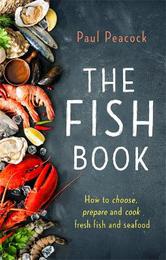
|
The Fish Book: How to choose, prepare and cook fresh fish and seafood
Paperback / softback
Main Details
| Title |
The Fish Book: How to choose, prepare and cook fresh fish and seafood
|
| Authors and Contributors |
By (author) Paul Peacock
|
| Physical Properties |
| Format:Paperback / softback | | Pages:240 | | Dimensions(mm): Height 196,Width 128 |
|
| Category/Genre | Cooking with fish and seafood |
|---|
| ISBN/Barcode |
9781472139207
|
| Classifications | Dewey:641.692 |
|---|
| Audience | |
|---|
|
Publishing Details |
| Publisher |
Little, Brown Book Group
|
| Imprint |
Robinson
|
| Publication Date |
3 August 2017 |
| Publication Country |
United Kingdom
|
Description
This book will give you the knowledge and confidence to choose, prepare, cook and enjoy fresh food and seafood. It explains simply how to gut, clean and fillet fish and how to deal with shellfish and crustaceans such as crab and lobster, and what knives and tools you'll need for the job. The numerous recipes take into consideration sustainable fishing and advise on which fish can be used instead of those at risk. The book also encourages the use of locally caught produce rather than those shipped around the world. As well as recipes for cooking sea and river fish, shellfish, crustaceans you'll discover how to preserve fish.
Author Biography
Author Paul Peacock has written over 30 books on gardening, self sufficiency, curing meats, making cheese and sausages, keeping bees and poultry. He writes for the Daily Mirror as Mr Digwell, the cartoon gardener - the longest running gardening newspaper column in the world. He has been a regular contributor to BBC Radio 4's Gardener's Question Time and appeared on numerous television shows. He runs the www.citycottage.co.uk website dedicated to the simple idea that the best food you will ever eat is cooked at home. Pauls passion for fish was kickstarted by a plate of fritto misto de mare, which remains his favourite dish (recipe in the book) and queenies cooked in cream topped with cheddar( recipe also in this book)! He believes the best fish in the world come from UK waters, that's why everyone buys it, far and wide, and, as Paul points out in this book, it is a tragedy the British hardly eat any of it. This book is hopefully a tiny step on the way to changing that.
|